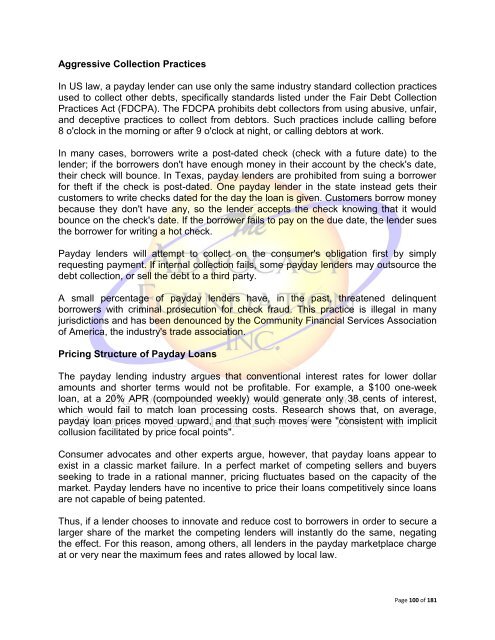You also want an ePaper? Increase the reach of your titles
YUMPU automatically turns print PDFs into web optimized ePapers that Google loves.
Aggressive Collection Practices<br />
In US law, a payday lender can use only the same industry standard collection practices<br />
used to collect other debts, specifically standards listed under the Fair Debt Collection<br />
Practices Act (FDCPA). The FDCPA prohibits debt collectors from using abusive, unfair,<br />
and deceptive practices to collect from debtors. Such practices include calling before<br />
8 o'clock in the morning or after 9 o'clock at night, or calling debtors at work.<br />
In many cases, borrowers write a post-dated check (check with a future date) to the<br />
lender; if the borrowers don't have enough money in their account by the check's date,<br />
their check will bounce. In Texas, payday lenders are prohibited from suing a borrower<br />
for theft if the check is post-dated. One payday lender in the state instead gets their<br />
customers to write checks dated for the day the loan is given. Customers borrow money<br />
because they don't have any, so the lender accepts the check knowing that it would<br />
bounce on the check's date. If the borrower fails to pay on the due date, the lender sues<br />
the borrower for writing a hot check.<br />
Payday lenders will attempt to collect on the consumer's obligation first by simply<br />
requesting payment. If internal collection fails, some payday lenders may outsource the<br />
debt collection, or sell the debt to a third party.<br />
A small percentage of payday lenders have, in the past, threatened delinquent<br />
borrowers with criminal prosecution for check fraud. This practice is illegal in many<br />
jurisdictions and has been denounced by the Community Financial Services Association<br />
of America, the industry's trade association.<br />
Pricing Structure of Payday Loans<br />
The payday lending industry argues that conventional interest rates for lower dollar<br />
amounts and shorter terms would not be profitable. For example, a $100 one-week<br />
loan, at a 20% APR (compounded weekly) would generate only 38 cents of interest,<br />
which would fail to match loan processing costs. Research shows that, on average,<br />
payday loan prices moved upward, and that such moves were "consistent with implicit<br />
collusion facilitated by price focal points".<br />
Consumer advocates and other experts argue, however, that payday loans appear to<br />
exist in a classic market failure. In a perfect market of competing sellers and buyers<br />
seeking to trade in a rational manner, pricing fluctuates based on the capacity of the<br />
market. Payday lenders have no incentive to price their loans competitively since loans<br />
are not capable of being patented.<br />
Thus, if a lender chooses to innovate and reduce cost to borrowers in order to secure a<br />
larger share of the market the competing lenders will instantly do the same, negating<br />
the effect. For this reason, among others, all lenders in the payday marketplace charge<br />
at or very near the maximum fees and rates allowed by local law.<br />
Page 100 of 181

















